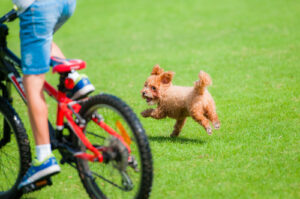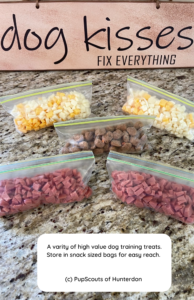Life with your puppy has no doubt been fun and full of adorable moments. You’ve probably also had times where you have felt overwhelmed and even frustrated. You’ve probably felt particularly frustrated when it seems like your puppy isn’t understanding or listening to what you are asking them to do when you’re trying to teach them new skills. Let’s explore how to teach your puppy to listen and what to do when you are asking yourself “why is my puppy so disobedient”? or “why is my stubborn puppy not listening”?
It’s important to remember that puppies, just like human babies, are learning and trying to make sense of the world around them. In this blog post, we’ll discuss three essential things every puppy parent should do when they feel their furry friend isn’t understanding or listening.
3 Things to Do When Your Puppy Isn’t Understanding You or Listening
Ask Yourself if You’re Working at Your Puppy’s Level:
It’s so important to work at your puppy’s level of understanding and physical ability. But what does this really mean? Let’s take a look at the human factor:
It’s easy for us humans to think our puppies should be able to do something.
We have a desire for our puppy to be able to do ‘the thing’ we are teaching.
As humans we can be impatient.
We tend to think our puppy should be ‘getting this’ by now.
Puppies need time to develop their skills, and expecting them to perform tasks they haven’t practiced or comprehend in distracting locations isn’t fair or effective. Remember that your puppy is still learning and needs clear, consistent guidance. Break down skills into simple steps and gradually increase the difficulty as your puppy becomes more proficient.
If we haven’t practiced at the park or pet store, it’s unfair to expect our puppy to be able to do the things we would like in these circumstances.
Why is my stubborn puppy not listening?
Let’s look at a few human examples you can relate to. Think of it this way:
You are a human resources manager and have done your job for the same company for the last 6 years. A better opportunity comes along, and you take the same human resources manager job at a new company.
You know what to do as a human resources manager, but it takes you time to learn and understand what you need to do and how to do it in this new environment. The change in location is not seamless. There is a learning curve before you can do your job as effectively and easily. It’s much harder in the beginning while you try to get the swing of things, but it becomes less of a struggle the more your practice your skills in the new environment.
Here is another example:
You are a server at a restaurant. You’ve worked there for 8 years and you’ve even trained new servers on how to do the job. An opportunity comes along at a different restaurant. Now, at your new job, you are learning how to do things from someone who has only been a server for two years. This person knows the process because they’ve worked there. You might have more experience as a server, but you don’t know the ins and outs of how to apply your skills right away at the new place. Your skills were fluid at the old restaurant, but it takes time for you to be able to apply everything you know in the new environment in order to be fluid in the new environment.
I think we can all relate to ‘knowing things’ but feeling like a fish out of water in a new place.
Ask Yourself if You’re Using the Right High-Value Rewards:
Using the right rewards is key to successful training. Puppies are easily distracted, and you need to be more exciting than the environment around them. Dogs do not do things just to please us. It’s a lovely thought, but it’s a myth. Puppies are opportunists and don’t have a sense of right or wrong; they’re simply motivated by what benefits them. We might not like to think of it that way, but that’s the ugly truth. Dogs are opportunists and do what works for them.
Find out what rewards your puppy loves. Not just likes, but REALLY loves. All food rewards are not created equal. By using high-value rewards, you’ll create an association between obedience and positive experiences, increasing the likelihood of your puppy listening and understanding.
Think of your rewards as motivators. What motivates your puppy at home may not motivate your puppy at the park, in the neighborhood on walks, or at the pet store. Cheese may be a high motivator for your puppy in your backyard, but your puppy might snub their nose at cheese and have no interest in it at the park.
There isn’t anything wrong with your puppy. There is something wrong with the reward. Cheese just isn’t more exciting than other dogs, kids running, or the person jogging. These things are so exciting to your puppy and have their total attention. If you want your puppy to be able to play attention games, come to you when called, or any other skill, then what you have to offer MUST be better than the things in the environment that have your puppy’s full attention.
I bring at least 3 different types of food rewards with me when I’m working with my puppies off my property. Depending on the distraction, I shuffle between rewards.
Up the Ante!
Sometimes, when our puppies are struggling to understand or listen, we need to up the ante and make the rewards more enticing. A single treat for a challenging effort may not make a lasting impression if the puppy is being bombarded with distractions.
Instead, consider using a jackpot of treats when your puppy gets it right in a difficult situation. By doing so, you’ll reinforce the desired behavior and show your puppy that you’re more rewarding and exciting than the surrounding distractions.
Example Scenario: Imagine you’re in the park, trying to teach your puppy to come when called. However, your puppy is easily distracted by squirrels, other dogs, and children playing. In this situation, giving your puppy a single, small treat for successfully coming to you may not be as effective. Instead, consider using a jackpot of treats, making it more memorable and reinforcing their awesome decision to listen to you despite the distractions. By doing this, you’re showing your puppy that you are the best source of rewards and more enticing than the other stimuli in the park.
Dive into more about working at your puppy’s level.
What is a jackpot in Dog Training?
A jackpot means paying out with many food rewards, but there is a way to deliver the jackpot. My jackpots are usually a minimum of eight treats (this is why we want to make sure we cut them no bigger than the size of a pea or kernel of corn). Give your puppy one treat at time, one after the other.
Do not give your puppy one handful of treats to snarf down. Giving a handful of treats isn’t the same. Your puppy doesn’t understand they received more when you give them a fistful of treats. Your puppy just thinks they got one reward. They don’t understand that there was more in that one delivery. It is more effective to hand them one treat, one after the other. Your puppy will be excited and perk up when they realize they got more than one treat.
Final thoughts
So, when you think your puppy isn’t understanding or listening to you, it’s crucial to approach the situation with patience, understanding, and a willingness to adapt your training techniques. Let’s not focus on how to discipline a puppy that won’t listen.
Instead of feeling frustrated that your puppy isn’t listening, ask yourself how you can help your puppy understand what you’re asking. Remember, puppies don’t speak English and have no idea what you are saying. We need communicate with them in a way that they can understand.
Your puppy is learning and needs time to develop their skills. By working at their level, using the right high-value rewards, and upping the ante when necessary, you’ll create a positive and effective training environment. Ultimately, with consistent and patient training, your puppy will become better at understanding and responding to your cues, strengthening the bond between you and your furry friend.
Still trying to pull all the pieces of your puppy training together? Yes, please help me teach my puppy to be the amazing dog I know they are.












